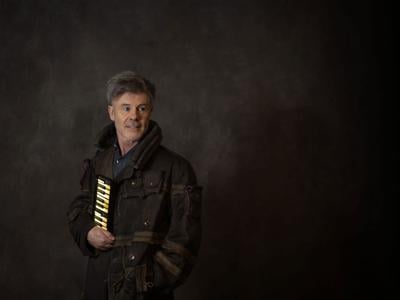Beyond the inescapable legacy of one of the most enduring and clever New Wave hits of the early 1980s — that’d be “She Blinded Me With Science” — what has always distinguished Thomas Dolby’s work is a playful appreciation for music in all of its forms, and a willingness to try new things and new sounds. A mad scientist of the synth lab and mixing board, he’s worked just as well with more rockist sensibilities, helping build bridges between all manner of subgenres and individuals. And that’s what makes him kind of a Zelig for the ’80s music scene as a whole, as well as one of the most fascinating people in the industry.
He was an essential part of the Mutt Lange process of helping rawk bands absorb new technologies and modes of recording, remaking and remodeling the very mindset that shaped how music was made at the time. He’s all over Foreigner’s 4 and Def Leppard’s Pyromania, made right as those bands were ramping up to whole new levels in what their sounds would become. And at the same time, he was also producing Whodini’s “Magic’s Wand” — so he’s also working the early stages of commercial hip-hop out of sheer love for the game, same as he would do for the sophisti-pop apotheosis of Prefab Spout later in the decade.
Before he put out his own first single, he wrote Lene Lovich’s hit “New Toy,” immortal to poptimists and holiday shoppers alike, setting himself up as a collaborator with fascinating women in music. Another notable example is Contortions keyboardist Adele Bertei’s first single “Build Me a Bridge,” a remarkable Rosetta Stone of a New York club record that feels right in freestyle, Italodisco, breakdance and Hi-NRG DJ sets despite defiantly doing its own thing. Yet another is late Yemenite singer Ofra Haza’s throbbing 1989 tasht-house single “Taw Shi,” which still sounds futuristic and ancient at the same time, a singular object built to make asses quake.
Dolby’s film score work is innovative, sometimes challenging. His score for the 1986 Ken Russell film Gothic is a marvel of anachronism and syncopated menace, and the songs and compositions he did for the infamous Howard the Duck serve the material perfectly — a perfect synecdoche of the mid-’80s that modern nostalgia skins never dig deep enough for. If you’ve never seen the 1990 Luca Bercovici film Rockula — and you should, because it rules — you’ll miss Dolby’s acting debut as a coffin impresario/Van Helsing wannabe who swordfights an angsty vampire who’s started a band that features Bo Diddley and Susan Tyrell. It is a delightful performance in a delightful film that indicates how much fun the world of music and media is around Thomas Dolby.
The tradition of the answer record is long and, while not noble, an essential part of mass culture. And after some criticism of his 1988 club jam “Airhead,” he worked with a female MC and recorded the answer record to his own single, doing the work to address and learn from his own drama. This is someone you just have to respect.
Remember that period of time in the Aughts when we loved to get calls on our phones? So much so that we would get polyphonic ringtones of our favorite jams and deploy them like little bite-size fragments of joy to spice up the day? Dolby helped develop the company and technology whereby that happened.
I can’t be objective, and I can’t get into the harmonics and the modalities and the full history of why. But Thomas Dolby is one of the coolest people alive, and he’s coming to the Beast on Sunday to remind us all that music is not only a liberating form of collective evolution, but also crazy fun.
Check out a curated playlist of music Dolby has made or collaborated on.





